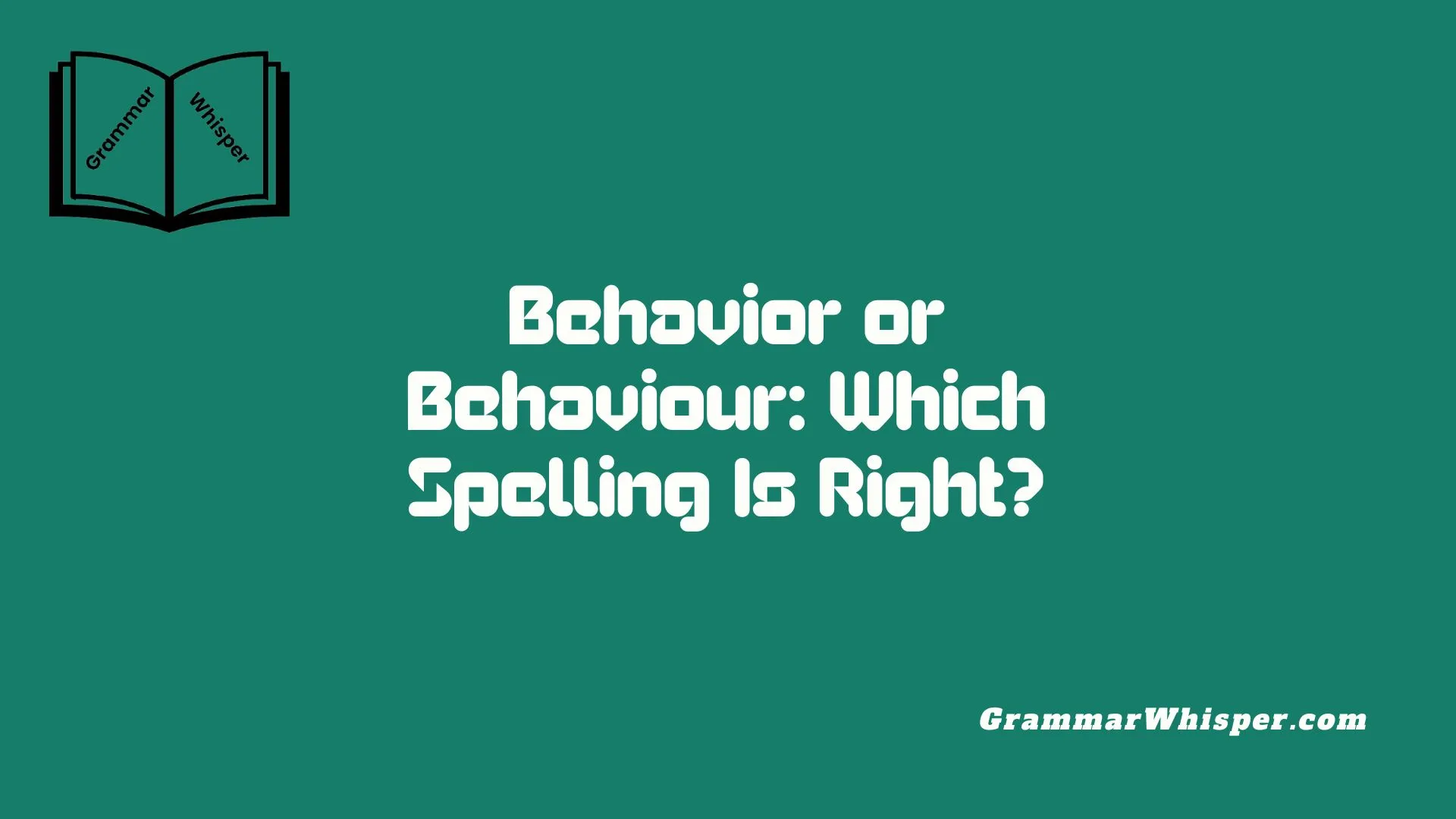Many writers find themselves wondering whether to use behavior or behaviour. These words seem identical, yet they differ in spelling depending on the geography – American or British. When I was editing content for an international company, I had to make sure the proper version was used. This small variation speaks to bigger themes – history, culture, and clarity in communication. Choosing the correct form depends on the reader and on when, where, and why you’re writing.
As a language editor, I created a simple guide with practical tips that outline common pitfalls for writers switching between audiences. In American English, it’s “behavior.” In British English, it’s “behaviour.” Understanding the broader context of regional rules makes your writing smoother and reduces confusion. Learning this subtle distinction not only improves style but also builds global understanding.
The Root of the Discrepancy: British vs. American Spelling
English is one language – but its spelling often tells two different stories. The divide between American and British English started taking shape during the 18th and 19th centuries.
The Noah Webster Effect
Noah Webster, the American lexicographer behind Webster’s Dictionary, intentionally reformed English spelling in the early 1800s. His goal? To simplify, nationalize, and distinguish American writing from its British origins.
He proposed:
- “Color” instead of “colour”
- “Behavior” instead of “behaviour”
- “Theater” instead of “theatre”
These weren’t random. Webster believed that spelling should match pronunciation and be easier to teach. The British, however, stuck with traditional spellings derived from Latin, Greek, and French influences.
🧠 Did You Know? The “-our” endings in British English often come from Old French, where “honour,” “favour,” and “labour” were common.
Behavior vs. Behaviour: What’s Correct Depends on Location
Both “behavior” and “behaviour” are correct, depending on your regional standard.
| Country/Region | Preferred Spelling |
| United States | Behavior |
| United Kingdom | Behaviour |
| Canada | Behaviour |
| Australia & New Zealand | Behaviour |
| South Africa | Behaviour |
| Philippines | Behavior |
| India | Behaviour (British-influenced) |
The American spelling (“behavior”) is dominant globally due to U.S. influence in tech, academia, and business, but the British version (“behaviour”) still holds strong in Commonwealth countries.
💬 Quote: “Spelling is more than convention. It’s identity.” – David Crystal, Linguist
Behavioral vs. Behavioural: The Derivative That Causes Confusion
Just when you think you’ve got it figured out, in walks behavioral (US) vs. behavioural (UK).
These are adjectives derived from the noun:
- Behavioral science
- Behavioural therapy
- Behavioral economics
Stick with the same regional spelling as the base word. If you’re writing for a UK audience, go with “behavioural.” Writing for an American reader? Use “behavioral.”
Examples in Real-World Usage
Seeing the words in actual context helps solidify their usage:
American Examples
- “Her behavior at the meeting was commendable.”
- “This research is grounded in behavioral psychology.”
British Examples
- “His behaviour towards the staff was unacceptable.”
- “She’s studying behavioural economics at Oxford.”
Let’s compare side-by-side:
| American English | British English |
| Customer behavior affects purchase trends. | Customer behaviour affects purchase trends. |
| Behavioral cues are essential in UX design. | Behavioural cues are essential in UX design. |
Spelling Patterns Shared with ‘Behaviour’
Once you understand the “-our” vs “-or” difference, you’ll notice a trend across many other words.
| American English (-or) | British English (-our) |
| Color | Colour |
| Flavor | Flavour |
| Honor | Honour |
| Labor | Labour |
| Neighbor | Neighbour |
| Behavior | Behaviour |
But it doesn’t stop there. British English also prefers:
- Centre over Center
- Organise over Organize
- Defence over Defense
These aren’t errors – they’re cultural variations.
Why People Make Mistakes with ‘Behavior’ and ‘Behaviour’
Even seasoned writers mix up regional spellings. Here’s why:
- Autocorrect & Spellcheck Defaults: If your writing software is set to “English (US),” it will flag “behaviour” as incorrect – even if you’re writing for a British audience.
- Unfamiliarity: Non-native English speakers often blend spellings without realizing it.
- Global Content Writing: Digital marketers and bloggers catering to international audiences can unintentionally mix styles.
- Copy-paste Errors: Pulling snippets from multiple sources without standardizing spelling.
How to Avoid These Spelling Mistakes
Keeping your spelling consistent isn’t just about correctness – it builds trust.
Pro Tips to Avoid Errors
- Set Your Region-Specific Spellcheck: In Google Docs, Word, and Grammarly.
- Use a Style Guide: AP (US), Oxford (UK), or house-specific guidelines.
- Choose One Style and Stick to It: Mixing US and UK spellings in one document makes it look unpolished.
- Install Writing Tools:
Spelling and Your Audience: Make It Relatable
Understanding who you’re writing for is crucial.
If Your Readers Are…
- In the US: Use “behavior,” “color,” “organize”
- In the UK or Commonwealth: Use “behaviour,” “colour,” “organise”
- Global/International: Choose one style and add a note explaining your choice, or use localization software
Case Study: Email Marketing Campaign
A brand sending emails globally noticed higher open rates when emails were localized:
- US version: “Improve Your Child’s Behavior”
- UK version: “Improve Your Child’s Behaviour”
Matching local norms creates trust and relatability.
The Impact of Consistency in Spelling
You may think one small letter doesn’t matter. But readers notice inconsistencies, especially in:
- Academic writing
- News articles
- Business documents
- Web content
Inconsistent Spelling Harms:
- Credibility: Appears unprofessional
- Readability: Distracts readers
- SEO Ranking: Confuses Google crawlers, lowers content trust
Memory Aids to Remember American vs. British Spelling
Stuck on which version to use? Try these simple tricks.
Mnemonics
- “U” is for “UK” → “Colour,” “Behaviour”
- No “U” in “USA” → “Color,” “Behavior”
Apps to Practice
- Quizlet: Create flashcards with UK vs US words
- Spelling City: Fun quizzes for learners
- Oxford Learner’s Dictionaries: Hear and compare both versions
Top Tools to Check and Correct Spelling Automatically
Don’t rely on memory alone. These tools make spelling seamless.
| Tool | Best For | Free/Paid |
| Grammarly | Overall writing assistant | Free + Paid |
| LanguageTool | Multilingual & UK/US detection | Free + Paid |
| ProWritingAid | Style, tone, and regional use | Free + Paid |
| Microsoft Word | Built-in US/UK options | Paid |
| Google Docs | Region-based autocorrect | Free |
Set your language preference to avoid unintended switches between styles.
Why Spelling Still Matters in a Digital World
Some argue spelling is becoming less important with the rise of emojis, abbreviations, and AI. That’s short-sighted.
Correct Spelling Reflects:
- Attention to detail
- Cultural awareness
- Professionalism
- Trustworthiness
Spelling mistakes may not always affect meaning – but they always affect perception.
Quick Example
Would you trust a resume with:
- “Organised behavioral campains for clients.”
- “Organized behavioral campaigns for clients.” (US)
- “Organised behavioural campaigns for clients.” (UK)
The second and third are fine – depending on the context. The first is a red flag.
Final Thoughts
Understanding whether to use “behavior” or “behaviour” is more than a spelling issue – it’s about clarity, consistency, and cultural awareness. While both versions are technically correct, their usage varies depending on geography, audience, and context. American English favors “behavior,” dropping the “u” in pursuit of simplicity, thanks to Noah Webster’s reforms. British English, on the other hand, maintains “behaviour,” preserving its French and Latin roots.
In today’s globalized world, content reaches people across regions. Whether you’re drafting an academic paper, publishing online content, or sending business emails, your choice in spelling can subtly signal professionalism – or carelessness.
FAQs
Is “behavior” wrong in the UK?
No, it’s not “wrong,” but it’s considered American English. In the UK, “behaviour” is standard and expected, especially in formal writing and education.
Do both spellings mean the same thing?
Yes, “behavior” and “behaviour” have the same definition. The only difference is in spelling, based on whether you follow American or British English conventions.
Can spell check tools detect the difference?
Yes. Most modern spell checkers can switch between American and British English. Be sure to select your preferred language setting to avoid unintentional inconsistencies.
Which version should I use for international content?
Pick one version – either American or British – and use it consistently. If you’re targeting a specific country, align your spelling with their standard to build reader trust.
Why is spelling consistency important in professional writing?
Inconsistent spelling looks unprofessional and can confuse readers. It affects your credibility and makes your writing appear rushed or poorly edited. Uniformity enhances clarity and trust.











